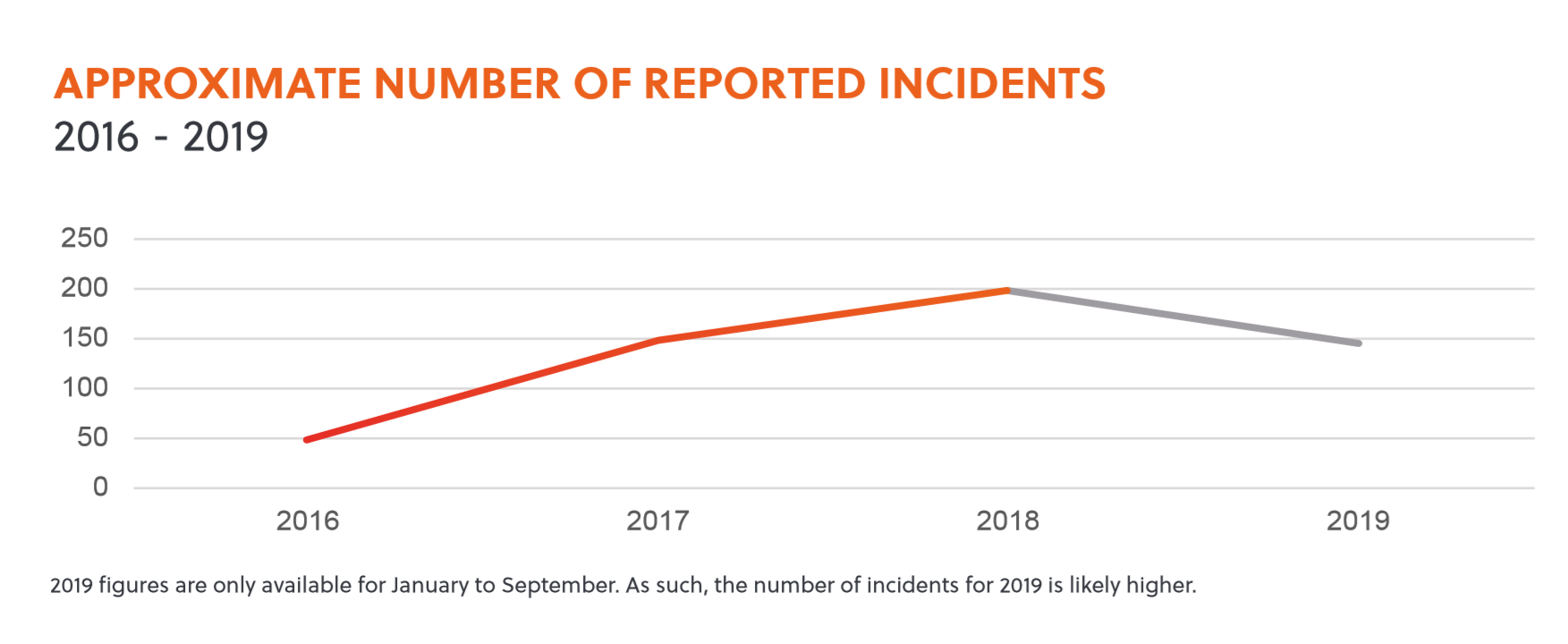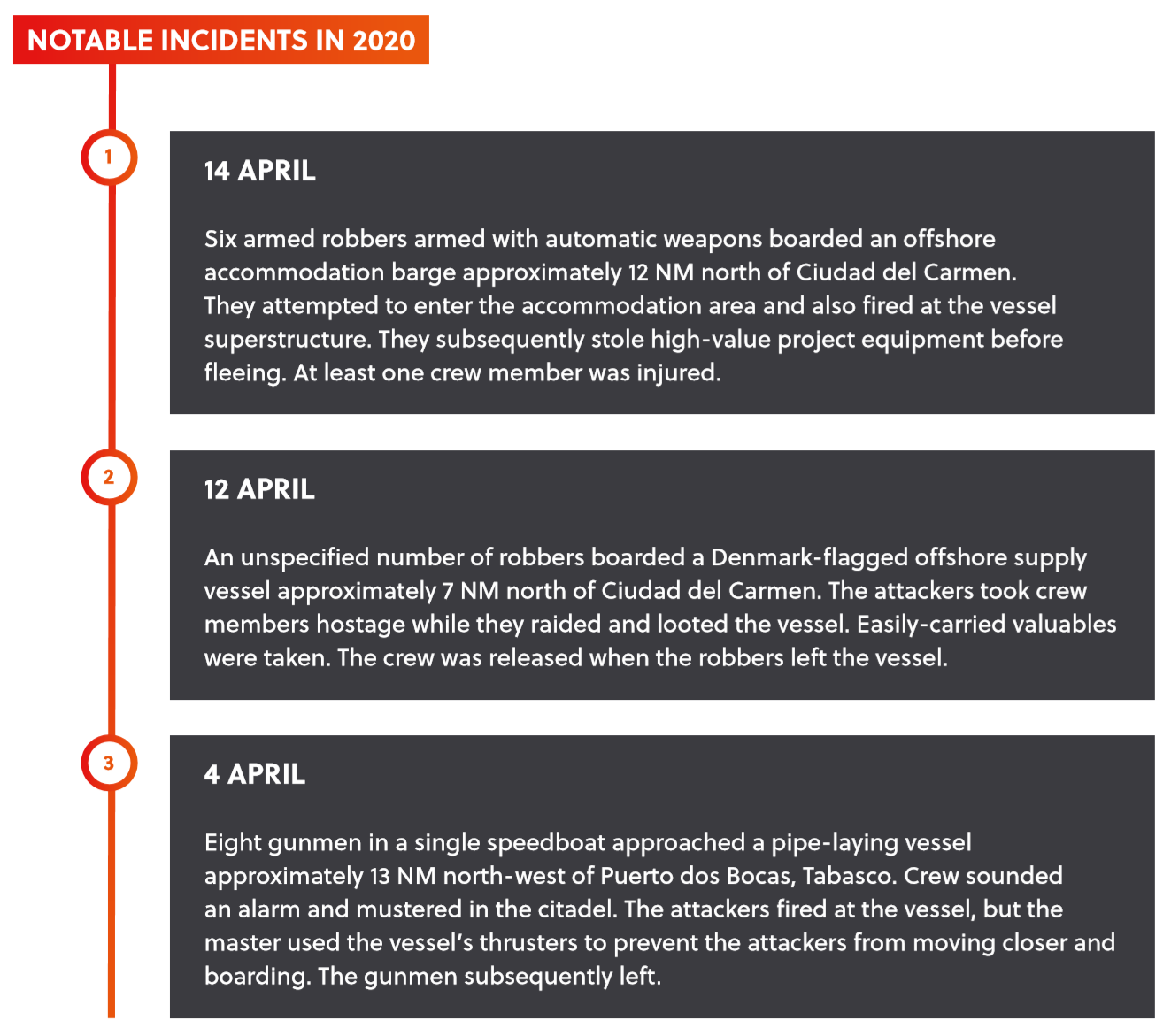Maritime insecurity in the Gulf of Mexico: Piracy and the Pandemic
While the number of reported attacks in the Gulf of Mexico and the Caribbean vary considerably among different publications and regional bodies, media reporting indicates that in 2020, the region saw an uptick in maritime crimes, including armed robberies. This prompted the US government to issue a security alert for the area in April, after five attacks were reported during the month. More than 2,000 offshore oil drilling platforms, supplying around 17 percent of the US’s crude oil, and 5 percent of its natural gas, are located in the Gulf. As such, the reported increase in maritime crime has prompted renewed concerns over the potential threats to commercial shipping in the area, particularly as the Covid-19 pandemic has contributed to a loss of security personnel in the offshore operating area.
OLD TRICKS
Piracy in the Gulf of Mexico is not a new phenomenon. A series of clustered attacks in April 2020 prompted media assumptions of a ‘surge’ in piracy in the region, although such attacks occur regularly, but are typically severely underreported. Between 2016 and 2018, for example, there was a 310 percent increase in the number of reported attacks, while in 2019, the International Transport Workers’ Federation (ITF) reported that there were 16 attacks on average between January and September. Such incidents have resulted in a high loss of revenue; for example, between 2016 and 2018, the state-owned Pemex oil company reportedly lost over MXN 224 million (USD 11.7 million) to offshore theft and armed robberies. The number is significantly higher, as Pemex failed to report the losses incurred in at least 312 attacks (80 percent of reported attacks).
Armed criminal groups operating in the Gulf of Mexico frequently target offshore operators, including drilling platforms, and offshore support and supply vessels for the local oil industry. Such attacks usually occur off the coasts of Campeche, Tabasco and Veracruz, and are prevalent between the ports of Ciudad del Carmen and Dos Bocas in the Campeche Bay area. Their motives are predominantly financial, and include siphoning fuel and oil from vessels and platforms, as well as stealing valuables and electronics, and easily-dismantled infrastructure. In 2018, criminals dismantled and stole around 40 percent of a heliport on the Tsimin-B platform. In another incident in January 2019, around 23 motorboats surrounded another platform off Ciudad del Carmen, and stole the rig’s perimeter lighting and 84 meters of cable.

PIRACY DURING THE PANDEMIC
The recent increase in maritime crimes in the Gulf of Mexico and Caribbean, particularly amid the ongoing Covid-19 pandemic, may be partially attributed to the combination of financial desperation and a less well secured offshore operating environment. Anecdotal accounts suggest that criminals that previously only operated onshore have now expanded their operations offshore to make up for lost income, as opportunities for extortion and kidnap for ransom dwindle. The loss of jobs and incomes amid the pandemic has also potentially contributed to a greater availability of unemployed oil rig workers, local fisherman and other individuals that criminals have typically hired to assist in armed robberies. These individuals are familiar with the area and are able to quickly dismantle infrastructure on vessels and platforms.
More organised criminal groups have been able to intensify their offshore activities due to a redeployment of a large portion of naval forces to urban centres to aid pandemic relief efforts. This is exacerbated by local regulations, many of which limit the ability of private security companies to operate offshore to bolster protection for vessels. However, despite these contributing factors, the apparent spike in activity – and the nature of the attacks in 2020 – is largely in line with the ongoing long-term increase in, and manifestation of, incidents.

OUTLOOK
Although the pandemic may have increased the opportunity and intent among criminal actors to stage attacks, other factors have likely also made the offshore environment a more attractive target over the last few years. Such factors include a growing number of investors, which has driven an increase in the presence of oil drilling platforms and supply vessels, and broadened the range of available targets. Ongoing insecurity in Mexico has likely further contributed to a permissive offshore security environment, which has grown increasingly more dangerous despite government efforts to improve their patrol and surveillance capabilities amid the oil fields. Local security forces further lack the requisite resources and capabilities to adequately detect and respond to offshore criminal attacks, as evidenced by multiple cases in which attackers are able to flee before authorities have reached the targeted vessel, even if the incident is close to shore.
These factors, compounded by social and economic instability brought on by the Covid-19 outbreak, will continue to drive maritime piracy and crime in the Gulf of Mexico in the coming months. Given the government’s inability to provide the requisite resources to naval and local security personnel, and its ongoing preoccupation with addressing the fallout of the pandemic, the offshore security environment is unlikely to see a significant improvement in the short term.
